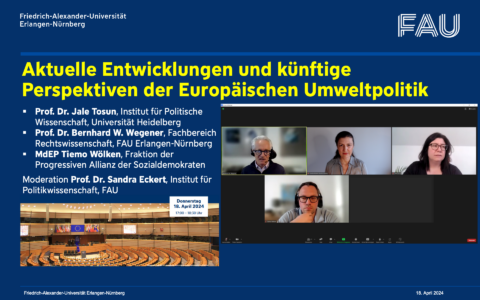Online Debate on European Environmental Policy
What are the consequences of the upcoming European elections for the future of European environmental policy? How can and should the EU respond to increasing social mobilisation and polarisation of environmental policy? These were the questions addressed by academic and political experts during an online discussion today. Prof. Jale Tosun from the Institute of Political Science at the University of Heidelberg, Prof. Bernhard W. Wegener from the Department of Law at FAU and Tiemo Wölken from the Progressive Alliance of Socialists and Democrats in the European Parliament contributed shared their views in the debate led by Prof. Sandra Eckert. Christian Doleschal MEP from the Group of the European People’s Party (Christian Democrats) in the European Parliament was unable to attend at short notice. The event was part of the series “The EU before the elections”, organized by Prof. Petra Bendel and Prof. Sandra Eckert and hosted by the Institute of Political Science and the Center for Human Rights at FAU.
The panelist’s assessment of European environmental policy during the last legislative period was mixed with regard to the implementation of the Green Deal agenda. Prof. Tosun saw a less ambitious approach in some areas of environmental policy when compared to climate policy. Prof. Wegener disagreed, saying that the climate agenda was also subject to massive criticism. MEP Tiemo Wölken began by emphasizing the prominent role of environmental policy in EU legislation but also noted a lack of ambition in some areas, such as biodiversity, the Circular Economy, and a more sustainable agricultural policy. Prof. Wegener emphasized that in the recent past, the EU has been operating in a changed geopolitical context, notably due to the war in Ukraine, and can count less on the cooperation of international partners. According to the panelists, we will not see a massive power shift caused by the upcoming elections, yet political agreement on environmental policy will become more difficult. Prof. Wegener argued that the increasing social polarisation on environmental policy issues represents the greatest challenge. He pointed out that environmental and climate policies are increasingly being questioned by representatives of the political center and are thus becoming highly contested issues in the European party competition. Based on her research, Prof. Tosun pointed out that politicization and activism are generally often volatile – she cited the mobilization against the approval of glyphosate as an illustrative example, which has declined in recent years despite the persistence of the problem. MEP Wölken named the socio-economic balance as a critical challenge for future European environmental policy. Instruments such as the “Just Transition Fund” must be used to ensure that climate protection measures are implemented in a socially just manner and that the European Union is not only perceived as the source of burdens but also as a supporting actor.
